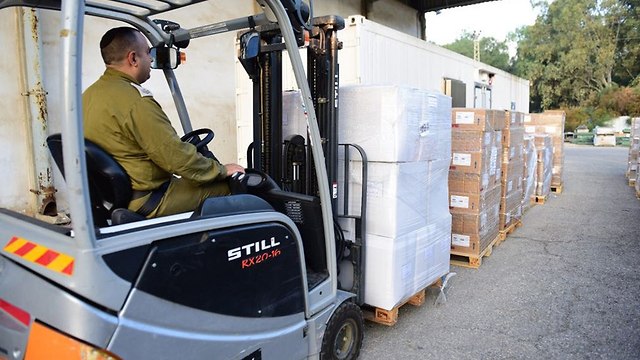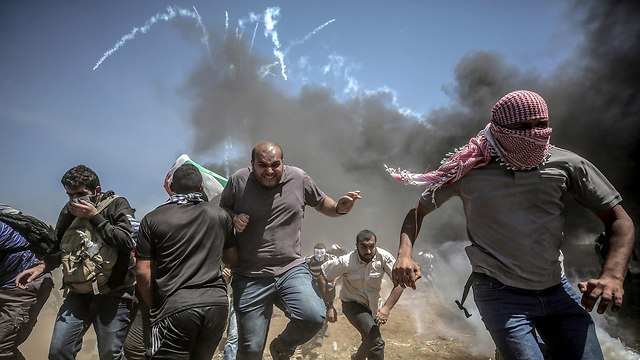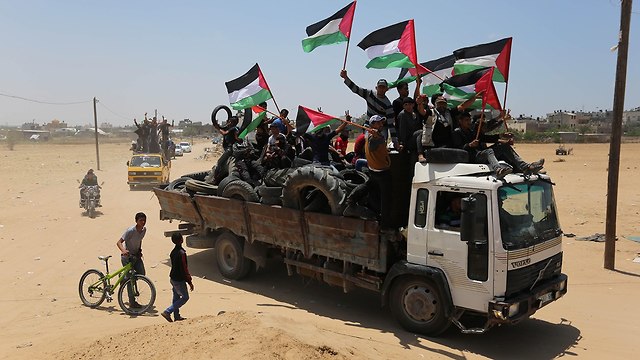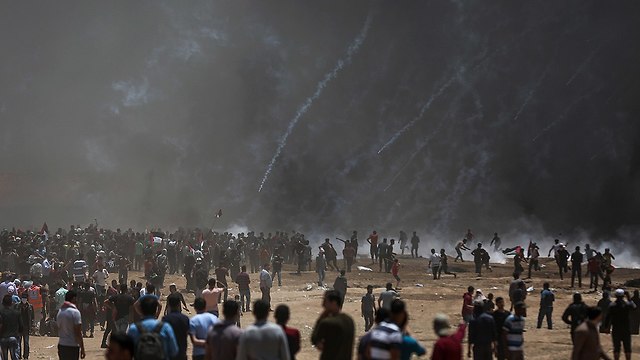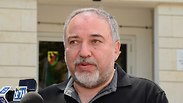
Defense Minister Lieberman
Photo: Herzel Yosef

Lieberman: Hamas leaders a 'bunch of cannibals'
Defense Minister Lieberman visits Gaza Division on backdrop of Gaza border riots, says Hamas treats its own children as arms; Hamas bars 2 IDF trucks bearing lifesaving medical equipment from entering strip; on relative border calm, Lieberman says Hamas 'dealt serious blow, sent scurrying back to doghouse.'
In light of recent conflagrations
on the Gaza Strip's border and Hamas's actions in allegedly fomenting terror,
Defense Minister Avigdor Lieberman said the terror group's leaders were a "bunch of cannibals that treat their own children as armaments."
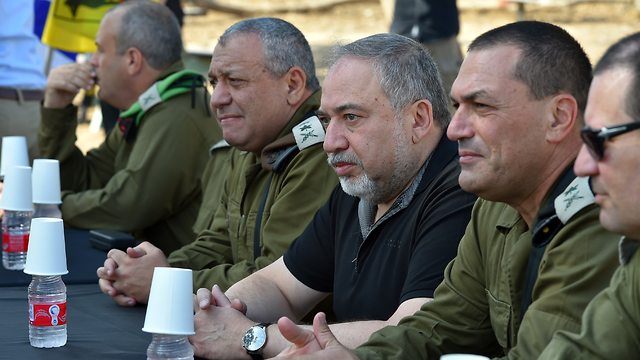 On the same matter, Hamas refused to allow two IDF Technological and Logistics Directorate trucks bearing hundreds of lifesaving medical equipment items to enter Gaza through the Kerem Shalom crossing Wednesday morning.
On the same matter, Hamas refused to allow two IDF Technological and Logistics Directorate trucks bearing hundreds of lifesaving medical equipment items to enter Gaza through the Kerem Shalom crossing Wednesday morning.
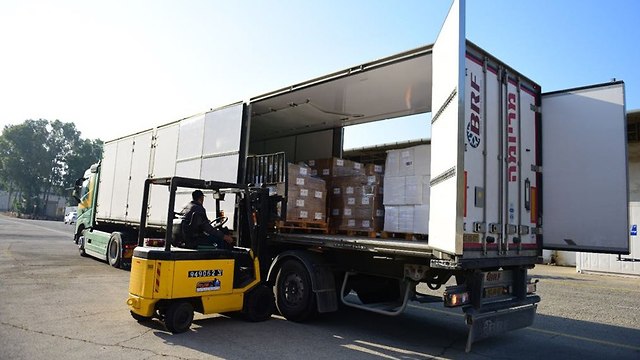
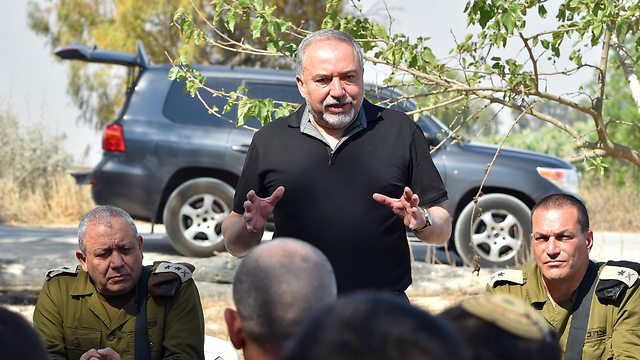
"They have rocket armaments, personal armaments, and a third kind—children or people," the defense minister said Wednesday on a visit to the IDF's Gaza Division.
"Their goal is to have the blockade removed, but not to build an economy or speak of coexistence, but to allow them to smuggle arms, to continue building the strength and to build a local model of Hezbollah," Lieberman added.

Defense Minister Lieberman (2nd right) said during a Gaza Division visit that Hamas used people and children as armaments (Photo: Ariel Hermoni, Defense Ministry)
The trucks thus returned to Israel, while six other trucks with similar medical equipment sent by UNICEF (the United Nations Children's Fund) and the Palestinian Authority were allowed to enter.

Hamas barred 2 Israeli trucks bearing humanitarian goods from entering Gaza through the Kerem Shalom crossing (Photo: IDF Spokesperson's Unit)
The Israeli medical equipment was intended to assist hospitals in the strip—caught wholly unprepared to handle the throngs of people being brought in from the riots—to cope with the situation.
For the same reason, Israel decided Monday to reopen the Kerem Shalom crossing after it was torched by rioters for the third time in ten days, reneging on its earlier decision to close it "until further notice."
An Israeli official said that the decision to reopen the crossing was made "as a result of Egyptian efforts to lower the flames of conflict and calm spirits down."
Mirroring the Israeli move, Egyptian officials communicated to their Palestinian counterparts that the Rafah border crossing will remain open until further notice.
While the crossing was set to close Wednesday, activities were extended until Thursday and there is currently no defined date for its closure.
Back to Lieberman, the defense minister added that Hamas has shown no willingness to recognize the State of Israel, accept the conditions set by the Middle East Quartet (the United Nations, United States, European Union and Russia—ed) or give up the right of return.

Tuesday's relative calms was born of the 'serious, significant blow' Hamas was dealt, Lieberman said (Photo: Ariel Hermoni, Defense Ministry)
Asked nevertheless how he explained Tuesday's relative calm, compared to the serious clashes the preceding day—in which 61 Palestinians were killed—Lieberman said, "First of all, they were hit hard and let there be no illusions—they did not forsake the riots or the terror processions.
"I assume we'll see more of that in the future. They have already explained the next hallmark day is Naksa Day (commemorating the Arab defeat in the 1967 Six Day War), and we'll see further such attempts on weekends leading up to June 5. But before all that, they were dealt a serious, significant blow and that's what sent them scurrying back into the doghouse."
On Egyptian mediation efforts between Israel and Hamas, Lieberman said there was a lot rumor mongering surrounding the matter, and that most emissaries acted of their own accord. "We've seen nothing significant, nothing serious," he claimed. "Our offer is openly, transparently on the table—rehabilitation in return for demilitarization."
"They cannot be given calm and a removal of the blockade only to continue building their strength and smuggling arms," he stated.
Moving on to speak about the army's handling of the recent border riots, Minister Lieberman extolled its conduct. "The IDF acted in accordance with moral norms the likes of which have not been seen anywhere in the world," he said unequivocally.
"I've never heard (Syrian President Bashar) Assad denounced for 600,000 deaths. More than 100 people are killed in the Middle East every day. When I look at all the arenas—Libya, Yemen, Iraq, Lebanon or Syria—I have yet to hear a peep from MKs or the media," he continued.
It was, therefore, a "celebration of hypocrisy" according to the Yisrael Beytenu chief. "Try to imagine that might have happened if that mob had reached Kerem Shalom, Nahal Oz or anyplace else," he asked.
"I propose to everyone to try and think what might have happened had that mob succeeded in infiltrating one of those communities. We all saw what happened when that mob reached the Palestinian side of Kerem Shalom (border crossing). Kerem Shalom is the oxygen line, it's really the only lifeline the Gaza Strip has," he concluded.
Addressing the Gaza Division's soldiers and commanders, Lieberman wished to thank them, saying he had met with the brigade commander, battalion commanders and company commanders.
"I'm here to thank them for the amazing job they've been doing here since Passover, both on the professional and normative levels. Farmers here till their fields until the last millimeter and people are going about their routines, as if nothing's happening on the fence," he explained.
"We've gone through Passover and Independence Day without a hitch thanks to the efforts put in by these soldiers and commanders," he commended.
Finally, the minister spoke about the crisis in relations between Turkey and Israel, following the 2013 reconciliation agreement between the countries and most recent deterioration in the wake of the Gaza riots—which culminated in the downgrading of diplomatic relations and mutual humiliations.
"My opinion is very clear. The agreement with the Turks was a mistake. I was against it even before the apology, and I voted against it in Cabinet. Exactly what I said was going to happen, happened. We need some forethought, and unfortunately everything I said then—and it's on the record—came to pass," he lamented.














